(完整word版)高中英语语法被动语态详解
高中英语知识点归纳被动语态
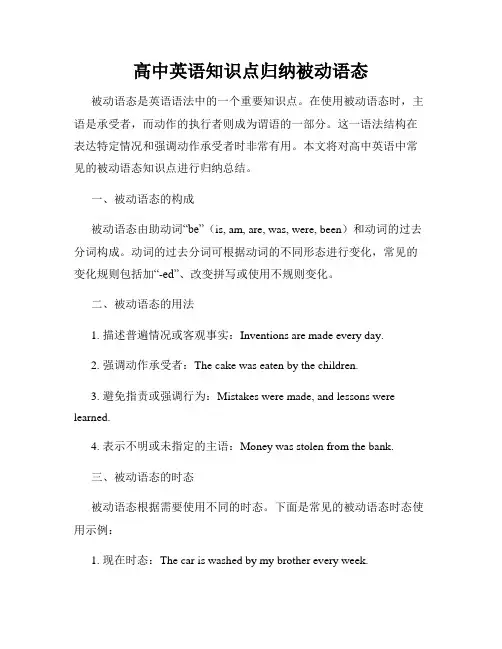
高中英语知识点归纳被动语态被动语态是英语语法中的一个重要知识点。
在使用被动语态时,主语是承受者,而动作的执行者则成为谓语的一部分。
这一语法结构在表达特定情况和强调动作承受者时非常有用。
本文将对高中英语中常见的被动语态知识点进行归纳总结。
一、被动语态的构成被动语态由助动词“be”(is, am, are, was, were, been)和动词的过去分词构成。
动词的过去分词可根据动词的不同形态进行变化,常见的变化规则包括加“-ed”、改变拼写或使用不规则变化。
二、被动语态的用法1. 描述普遍情况或客观事实:Inventions are made every day.2. 强调动作承受者:The cake was eaten by the children.3. 避免指责或强调行为:Mistakes were made, and lessons were learned.4. 表示不明或未指定的主语:Money was stolen from the bank.三、被动语态的时态被动语态根据需要使用不同的时态。
下面是常见的被动语态时态使用示例:1. 现在时态:The car is washed by my brother every week.2. 过去时态:The letter was sent yesterday.3. 将来时态:The contract will be signed next week.4. 现在进行时态:The house is being built by a group of workers.5. 现在完成时态:The book has been read by many people.四、被动语态与不定式、情态动词的使用1. 被动语态与不定式:The house needs to be repaired.2. 被动语态与情态动词:The project should be completed by tomorrow.五、被动语态的特殊情况1. 特殊疑问句:Where was the bag found?2. 感叹句:How beautifully the song was sung by the singer!3. 含有两个宾语的句子:We were given a gift by our friends.六、被动语态中的常见错误1. 错误的主语:The book is written by Shakespeare.(改为“The book was written by Shakespeare.”)2. 错误的时态:The photos were taken by me last weekend.(改为“The photos have been taken by me.”)通过对高中英语被动语态知识点的归纳总结,我们可以更好地理解和应用被动语态。
完整word版必修二unit2语法讲解将来时被动语态
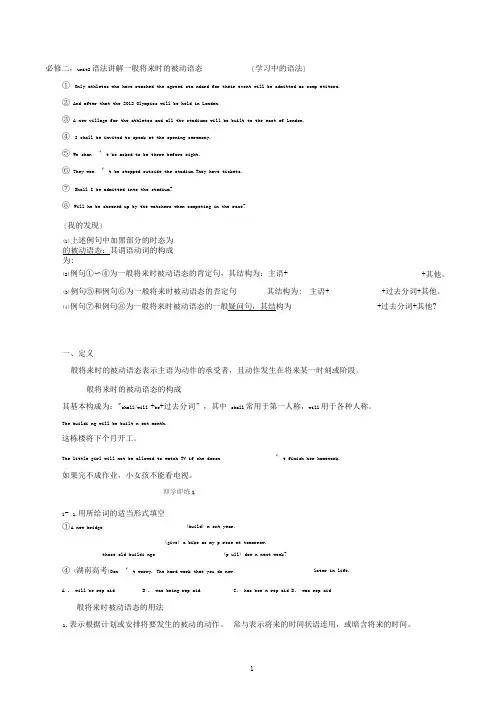
①Only athletes who have reached the agreed sta ndard for their event will be admitted as comp etitors.②And after that the 2012 Olympics will be held in London.③ A new village for the athletes and all the stadiums will be built to the east of London.④I shall be invited to speak at the opening ceremony.⑤We shan ‘ t be asked to be there before eight.⑥They won ‘ t be stopped outside the stadium.They have tickets.⑦Shall I be admitted into the stadium?⑧ Will he be cheered up by the watchers when competing in the race?[我的发现](1)上述例句中加黑部分的时态为的被动语态:其谓语动词的构成为:(2)例句①〜④为一般将来时被动语态的肯定句,其结构为:主语+(4)例句⑦和例句⑧为一般将来时被动语态的一般疑问句,其结构为一、定义般将来时的被动语态表示主语为动作的承受者,且动作发生在将来某一时刻或阶段。
般将来时的被动语态的构成其基本构成为:"shall/will +be+过去分词”,其中shall常用于第一人称,will用于各种人称。
The buildi ng will be built n ext month.这栋楼将下个月开工。
The little girl will not be allowed to watch TV if she doesn ‘ t finish her homework.如果完不成作业,小女孩不能看电视。
(完整word)高中英语被动语态讲解与练习(含答案)-推荐文档
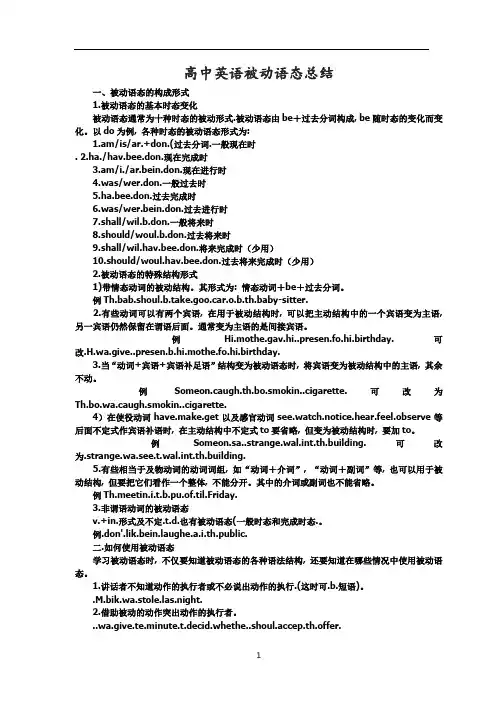
高中英语被动语态总结一、被动语态的构成形式1.被动语态的基本时态变化被动语态通常为十种时态的被动形式.被动语态由be+过去分词构成, be随时态的变化而变化。
以do为例, 各种时态的被动语态形式为:1.am/is/ar.+don.(过去分词.一般现在时. 2.ha./hav.bee.don.现在完成时3.am/i./ar.bein.don.现在进行时4.was/wer.don.一般过去时5.ha.bee.don.过去完成时6.was/wer.bein.don.过去进行时7.shall/wil.b.don.一般将来时8.should/woul.b.don.过去将来时9.shall/wil.hav.bee.don.将来完成时(少用)10.should/woul.hav.bee.don.过去将来完成时(少用)2.被动语态的特殊结构形式1)带情态动词的被动结构。
其形式为: 情态动词+be+过去分词。
例Th.bab.shoul.b.take.goo.car.o.b.th.baby-sitter.2.有些动词可以有两个宾语, 在用于被动结构时, 可以把主动结构中的一个宾语变为主语, 另一宾语仍然保留在谓语后面。
通常变为主语的是间接宾语。
例Hi.mothe.gav.hi..presen.fo.hi.birthday.可改.H.wa.give..presen.b.hi.mothe.fo.hi.birthday.3.当“动词+宾语+宾语补足语”结构变为被动语态时, 将宾语变为被动结构中的主语, 其余不动。
例Someon.caugh.th.bo.smokin..cigarette.可改为Th.bo.wa.caugh.smokin..cigarette.4)在使役动词have.make.get以及感官动词see.watch.notice.hear.feel.observe等后面不定式作宾语补语时, 在主动结构中不定式to要省略, 但变为被动结构时, 要加to。
高中英语被动语态讲解及练习(含答案)
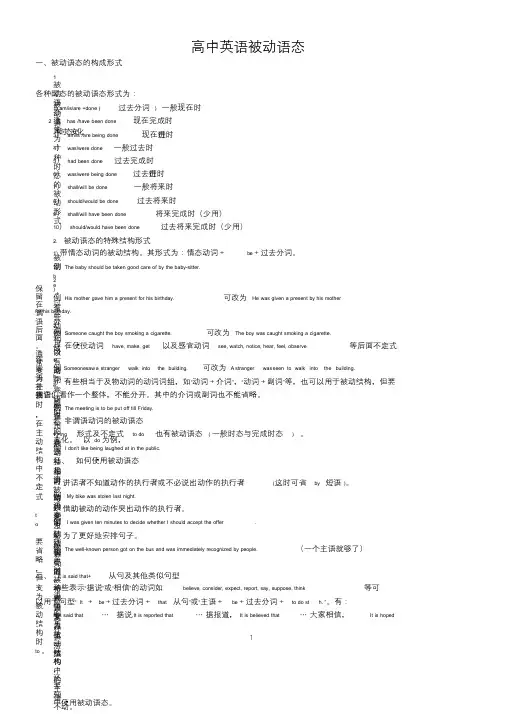
例The glass is broken.(系表结构)
The glass was broken by the boy.(被动语态)
2.如果句中有地点、频率或时间状语时,一般为被动语态。
7.“outof+名词”结构;表示“超出⋯⋯之外“,常见的有:out of control (控制不了),out of sight(超
出视线之外),out of one’s reach够(不着), out of fashion(不流行)等。
例The plane was out of control (can’t be controlled.)。
据建议。
例It is said that the boy has passed the national exam.(=The boy is said to have passed the
national exam.)
四、谓语动词的主动形式表示被动意义
1.英语中有很多动词如break,catch,clean,drive,lock,open,sell,read,write,wash等,当它
10)should/would have been done过去将来完成时(少用)
2.被动语态的特殊结构形式
1)带情态动词的被动结构。其形式为:情态动词+be+过去分词。
例The baby should be taken good care of by the baby-sitter.
2)有些动词可以有两个宾语,在用于被动结构时,可以把主动结构中的一个宾语变为主语,另一宾语仍然
6.在therebe⋯句型中,当动词不定式修饰名词作定语时,不定式用主动式作定语,重点在人,用被动形
(完整word版)八种时态主动语态被动语态
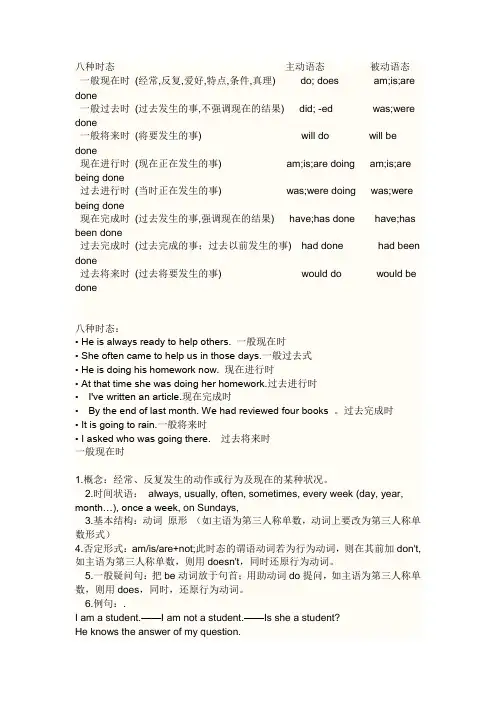
八种时态主动语态被动语态一般现在时(经常,反复,爱好,特点,条件,真理) do; does am;is;are done一般过去时(过去发生的事,不强调现在的结果) did; -ed was;were done一般将来时(将要发生的事) will do will be done现在进行时(现在正在发生的事) am;is;are doing am;is;are being done过去进行时(当时正在发生的事) was;were doing was;were being done现在完成时(过去发生的事,强调现在的结果) have;has done have;has been done过去完成时(过去完成的事;过去以前发生的事) had done had been done过去将来时(过去将要发生的事) would do would be done八种时态:• He is always ready to help others. 一般现在时• She often came to help us in those days.一般过去式• He is doing his homework now. 现在进行时• At that time she was doing her homework.过去进行时• I've written an article.现在完成时• By the end of last month. We had reviewed four books 。
过去完成时• It is going to rain.一般将来时• I asked who was going there. 过去将来时一般现在时1.概念:经常、反复发生的动作或行为及现在的某种状况。
2.时间状语:always, usually, often, sometimes, every week (day, year, month…), once a week, on Sundays,3.基本结构:动词原形(如主语为第三人称单数,动词上要改为第三人称单数形式)4.否定形式:am/is/are+not;此时态的谓语动词若为行为动词,则在其前加don't,如主语为第三人称单数,则用doesn't,同时还原行为动词。
被动语态详解(Word版)
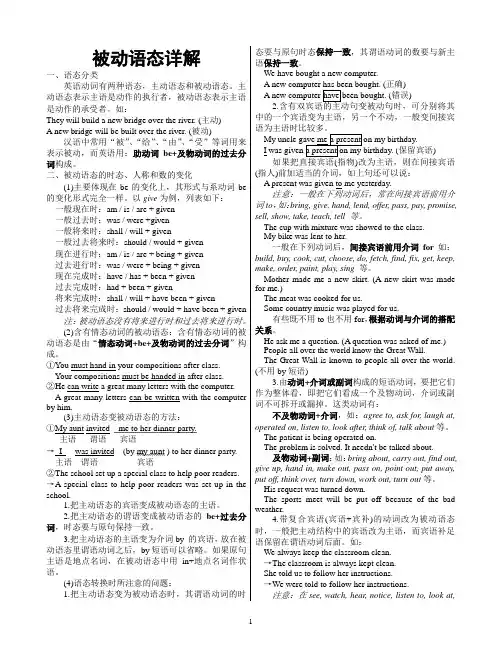
被动语态详解一、语态分类英语动词有两种语态,主动语态和被动语态。
主动语态表示主语是动作的执行者,被动语态表示主语是动作的承受者。
如:They will build a new bridge over the river. (主动)A new bridge will be built over the river. (被动)汉语中常用“被”、“给”、“由”、“受”等词用来表示被动,而英语用:助动词be+及物动词的过去分词构成。
二、被动语态的时态、人称和数的变化(1)主要体现在be的变化上,其形式与系动词be 的变化形式完全一样。
以give为例,列表如下:一般现在时:am / is / are + given一般过去时:was / were +given一般将来时:shall / will + given一般过去将来时:should / would + given现在进行时:am / is / are + being + given过去进行时:was / were + being + given现在完成时:have / has + been + given过去完成时:had + been + given将来完成时:shall / will + have been + given过去将来完成时:should / would + have been + given 注:被动语态没有将来进行时和过去将来进行时。
(2)含有情态动词的被动语态:含有情态动词的被动语态是由“情态动词+be+及物动词的过去分词”构成。
①You must hand in your compositions after class.Your compositions must be handed in after class.②He can write a great many letters with the computer.A great many letters can be written with the computer by him.(3)主动语态变被动语态的方法:①My aunt invited me to her dinner party.主语谓语宾语→I was invited (by my aunt ) to her dinner party.主语谓语宾语②The school set up a special class to help poor readers. →A special class to help poor readers was set up in the school.1.把主动语态的宾语变成被动语态的主语。
(完整word版)八种时态主动语态被动语态
八种时态主动语态被动语态一般现在时(经常,反复,爱好,特点,条件,真理) do; does am;is;are done一般过去时(过去发生的事,不强调现在的结果) did; -ed was;were done一般将来时(将要发生的事) will do will be done现在进行时(现在正在发生的事) am;is;are doing am;is;are being done过去进行时(当时正在发生的事) was;were doing was;were being done现在完成时(过去发生的事,强调现在的结果) have;has done have;has been done过去完成时(过去完成的事;过去以前发生的事) had done had been done过去将来时(过去将要发生的事) would do would be done八种时态:• He is always ready to help others. 一般现在时• She often came to help us in those days.一般过去式• He is doing his homework now. 现在进行时• At that time she was doing her homework.过去进行时• I've written an article.现在完成时• By the end of last month. We had reviewed four books 。
过去完成时• It is going to rain.一般将来时• I asked who was going there. 过去将来时一般现在时1.概念:经常、反复发生的动作或行为及现在的某种状况。
2.时间状语:always, usually, often, sometimes, every week (day, year, month…), once a week, on Sundays,3.基本结构:动词原形(如主语为第三人称单数,动词上要改为第三人称单数形式)4.否定形式:am/is/are+not;此时态的谓语动词若为行为动词,则在其前加don't,如主语为第三人称单数,则用doesn't,同时还原行为动词。
高中英语人教版:必修一+被动语态+Word版
被动语态(一)简介在英语中,语态是动词的一种形式,表示主语和谓语的关系。
英语动词有两种语态,即主动语态和被动语态。
主动语态(active voice) 表示主语是动作的执行者;被动语态(passive voice)表示主语是动作的承受者。
如:Saddam is being tried. 萨达姆正在接受审判。
The Iraqi government is trying Saddam. 伊拉克政府正在审判萨达姆。
More and more people use computers now.(主动语态)Computers are more and more widely used now.(被动语态)English is spoken all over the world. (被动语态)(二)英汉两种语言在表达被动方式上的差异汉语表达被动语态非常简单明了,用“被”“遭”“受”等词来表示,如“被捕”、“被杀”、“受到凌辱”等。
而英语表达被动的方式也不复杂,用“助动词be+动词的过去分词”表示。
其中助动词be有人称、数量和时态的变化,而这正是英语被动语态的难点。
(三)被动语态的构成被动语态由“be+及物动词的过去分词”构成。
这里要强调一定是及物动词的过去分词,因为不及物动词不能带宾语,也就不可能有被动语态。
英语主动语态有16个时态;被动语态常用的有8个,以give为例说明如下:被动语态的疑问句是将第一个助动词移到主语之前、句末用问号;否定式是在第一个助动词后加not 或never等其他否定词、句末用句号。
如:“During the interview, were you asked questions in English?” “No, I wasn’t asked questions in English.” “面试的时候,用英语问你问题了吗?”“没有,没有用英语问我问题。
”The origin of the universe will probably never be explained. 宇宙的起源大概永远也不会被解释清楚。
(完整word版)高中英语语法被动语态
高中英语语法-被动语态一.定义语态(voice)表示主语与谓语动词之间的关系。
当主语是动作的动词用(Active V oice);如果主语是动作的,动词便用(Passive V oice)。
被动语态由be+及物动词的过去分词构成。
二.考点:考查时态和语态的掌握、与主谓一致连考题型:①②例1.The problem solved and the foreigner got into the taxi.(短文改错)2.Now college graduates (encourage)to start their own business which sounds really good for them.(语法填空)3.Truly elegant chopstics might (make)of gold and silver with Chinese characters.(语法填空)三.做题步骤①判断语态②判断时态③套用具体时态的被动语态形式④注意主谓一致四.各种时态的被动语态形式1) 一般现在时:Subject+ be(am/is/are) +done (过去分词)2)一般过去时:3)一般将来时: Subject+ shall/will/ be going to be done (过去分词)4)过去将来时:5)现在进行时: Subject+ be(am/is/are) being done(过去分词)6)过去进行时:7)现在完成时: Subject+has /have been done8)过去完成时:9)带有情态动词时: Subject+情态动词+be+done (过去分词)五.掌握基础,学以致用(用所给动词适当形式填空)1.Visitors (request) not to take photos here.2. The classroom must (clean) every day.3. I (give) ten minutes to decide whether I studied abroad or not.4. you (invited) to a party held in the sckool hall tomorrow.5. A new cinema (build)here now.6.The manager entered the office and was happy to learn that four-fifths of the tickets _ _.(book)7. A meeting (hold) when I was there.8. ---- Have you moved into the new house?---- Not yet, the rooms ___ __.(paint)9. The letter (receive)already.10. He said a satisfying plan (put) forward next week.六.被动语态与系表结构的区别并非所有的“be+过去分词”都为被动语态;有些为系表结构。
(完整word版)被动语态的用法
被动语态的用法学习被动语态的几个问题被动语态是动词的一种特殊形式,表示句子中的主语是动作的承受者,汉语往往用“被"、“受”、“给”等词来表示被动意义。
1. 被动语态的各种时态被动语态(The Passive Voice)是动词的一种形式,表示主语是谓语动词的承受者。
被动语态便于论述客观事实,故常用于科技文章、新闻报道、书刊介绍以及景物描写.被动语态没有将来进行时、过去将来进The boy is called Johnson.2)一般过去时 Where were you educated?3)一般将来时 The result will not be announced until 6 o’clock.4)现在进行时 The road is being repaired。
5)过去进行时 He was being looked after by his sister.6)现在完成时 She hasn’t been told about it yet.7)过去完成时 She told me that the factory had been closed down.8)将来完成时 This project will have been completed by the end of this year.2。
主动语态变被动语态需要注意的几个问题。
(1)时态保持一致。
The teacher punished him many times for his lateness。
He has been punished many times for his lateness。
(2)谓语为动词短语的被动语态不能丢掉动词短语的介词或副词。
His best friend often looks after him.被动语态He is often looked after by his best friend。
(3)主动语态中若有双宾语,将其中一个宾语变为被动句的主语,另一个宾语不变。
- 1、下载文档前请自行甄别文档内容的完整性,平台不提供额外的编辑、内容补充、找答案等附加服务。
- 2、"仅部分预览"的文档,不可在线预览部分如存在完整性等问题,可反馈申请退款(可完整预览的文档不适用该条件!)。
- 3、如文档侵犯您的权益,请联系客服反馈,我们会尽快为您处理(人工客服工作时间:9:00-18:30)。
被动语态一、构成:1.助动词be+(及物动词的)过去分词。
语态是动词的一种形式,表示主语和谓语间的关系。
英语动词有主动语态和被动语态两种语态。
主动语态表示主语是动词的执行者,被动语态表示主语是动作的承受者。
例如:Many people speak English.English is spoken by many people.English is not spoken here.二、用法1.不知某事为谁所做:不知道谁是动作的执行者时,要用被动语态。
例如:(1)His watch was stolen yesterday. (2)This car is made in Japan.2.不必说出动作为谁所做:不必或不想指出谁是动作的执行者时,用被动语态。
例如:(1)This novel was written in 1886. (2)A bridge is being built over there. 3.为了强调或突出动作的承受者。
例如:(1)The matter was discussed at the meeting last week.(2)Wang Lin was elected monitor of the class.4. It is said that 等结构:在I was told that,It is said that,It is believed that,It is hoped that,It is suggested that 等习惯用语中用被动语态。
例如:(1)I was told that he had been wounded in the war.(2)It is reported that a new road will be built here.5.带有情态动词的被动语态结构:情态动词+be+过去分词。
(1) The book must be returned to the library at once.(2)The task can be finished in a week.6.带有不定式的被动语态结构:to be+过去分词。
例如:(1) A new hotel is going to be built here. (2)He didn’t want to be examined.7.短语动词是一个不可分割的整体,在变为被动语态时,不可漏掉组成短语的介词或副词。
例如:(1) The experiment has been carried out.(2) The old man is well taken care of.三、被动语态的疑难问题:1.主动语态变为被动语态的方法:(1)把主动语态的宾语变为被动语态的主语。
例如:1) She wrote the letter. ——The letter was written by her.2) He will water the flowers in the afternoon. ——The flowers will be watered ….(2)主动谓语转换成被动语态:be 动词要按新主语的人称、数作变化,谓语由主动结构变为被动结构。
例如:1) The policeman has caught the thieves.——The thieves have been caught by …2) The workers are repairing the watches.——The watches are being repaired by...2.有两种被动语态的动词:英语中有些动词,如:tell, pay, send, give, buy, show, offer, lend, leave, make, hand, throw, teach等,有时可以带两个宾语,一为间接宾语,一为直接宾语。
在变为被动语态时,通常把间接宾语(即代表人的宾语)变为被动语态的主语,但也可以把直接宾语(即代表人物的宾语)变为被动语态的主语。
例如:1) She asked him some questions.He was asked some questions by her. Some questions were asked him by her.2) Mother bought me a new coat. I was bought a new coat by mother.A new coat was bought for me by mother.3.被动语态中的by短语和with短语:用by短语表示动作的执行者,说明具体动作是由某人或某物执行的;用with短语表示做某事所用的工具或手段,或表示某种情况或状态。
例如:1) The letter was written by Henry. The letter was written with a pen.2) The tiger was killed by a hunter. The tiger was killed with a gun.4.smell sweet 结构:英语中有些动词,用主动语态形式表示被动语态意义,如连系动词feel, look, taste, smell, sound, prove等;当wash, cut, wear, clean, shut, lock, open, read, cook等用作不及物动词,表示主语的属性时,通常也要用主动形式表示被动意义。
例如:1) The flower smells sweet. This dish tastes good.These books sell very well. The car drives fast.2) The door won’t shut.这门关不上。
(主语的情况、属性,表示“门出问题了”)The door won’t be shut.这门不用关上。
(表示“不用关,不必关”,门无问题)The sentence reads clearly. The sentence is read clearly.5.“be+过去分词”结构有时并不是被动语态:某些动词,如等后的过去分词实际上已转化为形容词,作表语,表示状态、情绪等。
例如:1) He was surprised at the news. The book is well written.2) The road was mended. The road was mended by them.3) Those books are all sold out. Those books are sold quickly.6.不能用于被动语态的动词:(1) 不及物动词:不及物动词不可用于被动语态。
比较:1) (T) The boy slept well last night. (F) The boy was slept well last night.2) (T) The teacher is listened to carefully. (F) The teacher is listened carefully. (2) 状态动词:表示状态的动词,如have, lack, fit, hold, become等,不可用于被动语态。
另外,enter, join, miss也不用于被动语态。
比较:1) (T) The coat fits her well. (F) She is fit well by the coat.2) (T) He has a new bike. (F) A new bike is had by him.(3) 部分短语动词:英语中有大量的短语动词,有些可用于被动语态,有些则不可用于被动语态,需注意区别。
比较:1) The children have been well looked after.2) They quite agree with him. (F) He wasn’t quite agreed with by them.8.不可变为被动语态的句子:(1) myself 等:宾语是反身代词时不可变为被动语态。
比较:(T) She hid herself behind the door. (F) Herself was hid behind the door.(2) each other 等:宾语是相互代词时不可变为被动语态。
比较:(T) They helped each other. (F) Each other was helped.(3) live a happy life 等:同源宾语不可变为被动语态。
比较:(T) He dreamed a sweet dream. (F) A sweet dream was dreamed by him.(4) like swimming 等:宾语是动词不定式或动名词时不可变为被动语态。
比较:1) (T) I hoped to do the job. (F) To do the job is hoped by me.2) (T) They stopped talking just now. (F) Talking was stopped by them just now. (5) join the Party 等:组织、团体等名词作宾语时不可变为被动语态。
比较:(T) He joined the army last year. (F) The army was joined by him last year. (6) shut one’s mouth 等:宾语是主语(人)身上的某一部分或感官时不可变为被动语态。
比较:(T) He raised his hand. (F) Her hand was raised.(7) weigh 等:weigh(重达)等表示度量的动词,不可用于被动语态。
例如:(T) The box weighs 30 kilogram’s. (F) The box is weighed 30 kilogram’s.[提示]:①有些作宾语的动词不定式可以借用先行词it变为被动语态。
比较:They have decided to go by train tomorrow.It has been decided by them to go by train tomorrow.② be动词不可同时作连系动词和助动词。
例如:He is a good teacher and (is) respected by the students.③ get+ 过去分词也可以构成被动语态,常指偶然发生的事情,或没有计划、没有预料到的事情。
